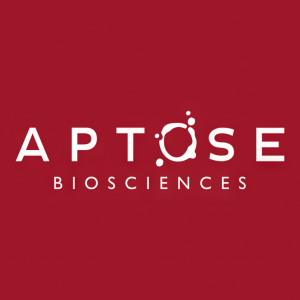Aptose’s Frontline Triple Drug Therapy with Tuspetinib Achieves Notable Responses in Newly Diagnosed AML Patients in the Phase 1/2 TUSCANY Trial
Rhea-AI Summary
Aptose Biosciences (NASDAQ: APTO, TSX: APS) reported promising early results from its Phase 1/2 TUSCANY trial testing tuspetinib in combination with venetoclax and azacitidine (TUS+VEN+AZA triplet) for newly diagnosed acute myeloid leukemia (AML) patients.
Key findings from the first cohort of four patients receiving the lowest dose (40mg) include:
- Two FLT3-wildtype patients achieved complete remissions by end of Cycle 1
- One patient with biallelic TP53 mutations achieved complete remission
- One patient showed significant reduction in bone marrow leukemic blasts
- The fourth patient with FLT3-ITD and NPM1 mutations is still in Cycle 1
The treatment showed favorable safety with no dose-limiting toxicities or dose adjustments needed. The TUSCANY trial aims to enroll 18-24 patients by mid-late 2025, testing various doses of tuspetinib with standard dosing of venetoclax and azacitidine.
Positive
- Complete remission achieved in TP53-mutated patient, a traditionally difficult-to-treat form of AML
- No dose-limiting toxicities observed in first cohort
- Pharmacokinetic levels remain stable with combination therapy
- Two out of three evaluable patients achieved complete remission in Cycle 1
Negative
- Small patient sample size (only 4 patients) in early trial phase
- Results are preliminary and require further validation
News Market Reaction – APTO
On the day this news was published, APTO gained 27.04%, reflecting a significant positive market reaction.
Data tracked by StockTitan Argus on the day of publication.
TUS+VEN+AZA triplet achieves Cycle 1 complete remission (CR) in TP53-mutated/CK AML
TUS+VEN+AZA triplet achieves Cycle 1 complete remissions in FLT3-wildtype AML patients
TUS+VEN+AZA triplet shows favorable safety with no alteration of VEN and AZA dosing
PK levels of TUS in the triplet remain equivalent to levels as TUS or TUS+VEN therapy
SAN DIEGO and TORONTO, Feb. 12, 2025 (GLOBE NEWSWIRE) -- Aptose Biosciences Inc. (“Aptose” or the “Company”) (NASDAQ: APTO, TSX: APS), a clinical-stage precision oncology company, today reported promising early safety and response results from newly diagnosed acute myeloid leukemia (AML) patients dosed in Aptose’s Phase 1/2 TUSCANY trial with a 40 mg dose of tuspetinib in combination with standard of care dosing of venetoclax and azacitidine (TUS+VEN+AZA triplet). The TUS+VEN+AZA triplet is being developed as a frontline therapy to treat large, mutationally diverse populations of newly diagnosed AML patients who are ineligible to receive induction chemotherapy.
In January 2025, Aptose announced the initiation of the TUSCANY trial and dosing in the first cohort of newly-diagnosed AML patients with the lowest starting dose (40 mg) of TUS as part of the TUS+VEN+AZA triplet, and the early data reveal promising clinical safety and antileukemic activity.
- To date, four newly diagnosed AML patients have received the lowest dose of TUS (40 mg) as part of the (TUS+VEN+AZA) combination.
- Three patients with unmutated (wildtype) FLT3 (FLT3-WT) completed Cycle 1 of treatment with no dose-limiting toxicities (DLTs) and no dose adjustments.
- Two FLT3-WT patients achieved complete remissions (CR and CRh) by the end of Cycle 1.
- Notably, a patient with biallelic TP53 mutations and a complex karyotype obtained CR.
- The third FLT3-WT patient experienced significant reductions in bone marrow leukemic blasts during Cycle 1 and remains on therapy in Cycle 2.
- The fourth patient, harboring FLT3-ITD and NPM1 mutations, is currently dosing in Cycle 1 and is not yet eligible for response evaluation
- Pharmacokinetic (PK) analyses for TUS show plasma levels unaffected by the addition of AZA, providing predictability and avoiding the need for dose alterations due to PK interactions.
“These are very promising early results from the TUSCANY trial of TUS+VEN+AZA and the first indicators of the safety and efficacy we expected to see in newly diagnosed AML patients,” said Rafael Bejar, M.D., Ph.D., Chief Medical Officer of Aptose. “To achieve a complete remission (CR) in Cycle 1 in a subject harboring a TP53 mutation – one of the most adverse forms of AML – is particularly encouraging. With enrollment ongoing in the TUSCANY study, we look forward to reporting additional data as it becomes available.”
“TUS+VEN+AZA triplet therapy has the potential to treat large AML patient populations, including those with traditionally difficult-to-treat mutations, and improve patient outcomes right from the outset of treatment,” said William G. Rice, Ph.D., Chairman, President and Chief Executive Officer of Aptose. The ability to treat such diverse AML populations – including FLT3 wildtype patients – with a favorable safety profile and without having to alter the standard of care dosing, differentiates our drug from many AML drugs in development.”
TUSCANY: TUS+VEN+AZA Triplet Phase 1/2 Study
Tuspetinib based TUS+VEN+AZA triplet therapy is being advanced in the TUSCANY Phase 1/2 trial with the goal of creating an improved frontline therapy for newly diagnosed AML patients that is active across diverse AML populations, durable, and well tolerated. Earlier APTIVATE trials of TUS as a single agent and in combination as TUS+VEN demonstrated favorable safety and broad activity in diverse relapsed or refractory (R/R) AML populations that went beyond the more prognostically favorable NPM1 and IDH mutant subgroups. Responses to TUS were also observed in those with prior-VEN and prior-FLT3 inhibitor (FLT3i) therapies, those with highly adverse TP53 and RAS mutations, and those with mutated or unmutated (wildtype) FLT3 genes.
The TUSCANY triplet Phase 1/2 study is designed to test various doses and schedules of TUS in combination with standard dosing of AZA and VEN for patients with AML who are ineligible to receive induction chemotherapy. A convenient, once daily oral agent, TUS will be administered in 28-day cycles, beginning at 40mg once daily, with dose escalations planned after a safety review of each dose level. Multiple U.S. sites are enrolling in the TUSCANY trial with anticipated enrollment of 18-24 patients by mid-late 2025. Data will be released as it becomes available.
More information on the TUSCANY Phase 1/2 study can be found on www.clinicaltrials.gov (here).
About Aptose
Aptose Biosciences is a clinical-stage biotechnology company committed to developing precision medicines addressing unmet medical needs in oncology, with an initial focus on hematology. The Company’s lead clinical-stage, oral kinase inhibitor tuspetinib (TUS) has demonstrated activity as a monotherapy and in combination therapy in patients with relapsed or refractory acute myeloid leukemia (AML) and is being developed as a frontline triplet therapy in newly diagnosed AML. For more information, please visit www.aptose.com.
Forward Looking Statements
This press release may contain forward-looking statements within the meaning of Canadian and U.S. securities laws, including, but not limited to, statements relating to the therapeutic potential and safety profile of tuspetinib (including the triplet therapy) and its clinical development, the anticipated enrollment rate in the TUSCANY trial and the timing thereof, as well as statements relating to the Company’s plans, objectives, expectations and intentions and other statements including words such as “continue”, “expect”, “intend”, “will”, “should”, “would”, “may”, and other similar expressions. Such statements reflect our current views with respect to future events and are subject to risks and uncertainties and are necessarily based upon a number of estimates and assumptions that, while considered reasonable by us are inherently subject to significant business, economic, competitive, political and social uncertainties and contingencies. Many factors could cause our actual results, performance or achievements to be materially different from any future results, performance or achievements described in this press release. Such factors could include, among others: our ability to obtain the capital required for research and operations and to continue as a going concern; the inherent risks in early stage drug development including demonstrating efficacy; development time/cost and the regulatory approval process; the progress of our clinical trials; our ability to find and enter into agreements with potential partners; our ability to attract and retain key personnel; changing market conditions; inability of new manufacturers to produce acceptable batches of GMP in sufficient quantities; unexpected manufacturing defects; and other risks detailed from time-to-time in our ongoing quarterly filings, annual information forms, annual reports and annual filings with Canadian securities regulators and the United States Securities and Exchange Commission.
Should one or more of these risks or uncertainties materialize, or should the assumptions set out in the section entitled "Risk Factors" in our filings with Canadian securities regulators and the United States Securities and Exchange Commission underlying those forward-looking statements prove incorrect, actual results may vary materially from those described herein. These forward-looking statements are made as of the date of this press release and we do not intend, and do not assume any obligation, to update these forward-looking statements, except as required by law. We cannot assure you that such statements will prove to be accurate as actual results and future events could differ materially from those anticipated in such statements. Investors are cautioned that forward-looking statements are not guarantees of future performance and accordingly investors are cautioned not to put undue reliance on forward-looking statements due to the inherent uncertainty therein.
For further information, please contact:
Aptose Biosciences Inc.
Susan Pietropaolo
Corporate Communications & Investor Relations
201-923-2049
spietropaolo@aptose.com








